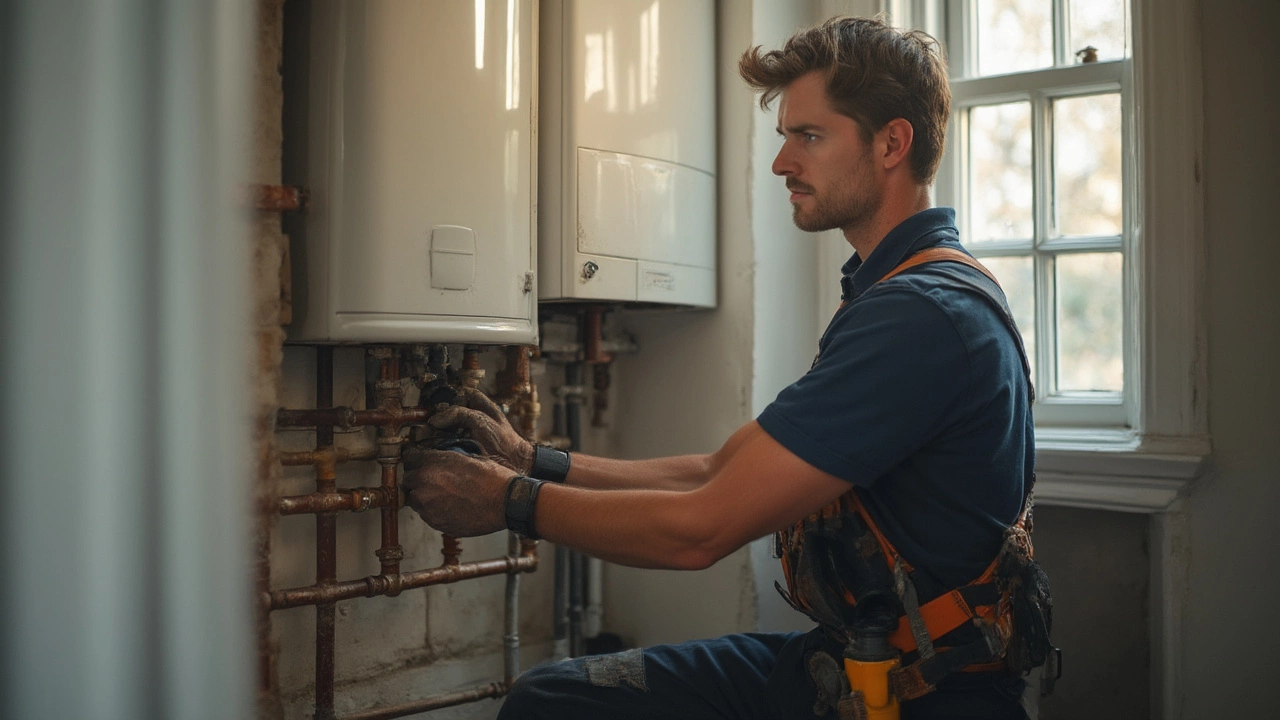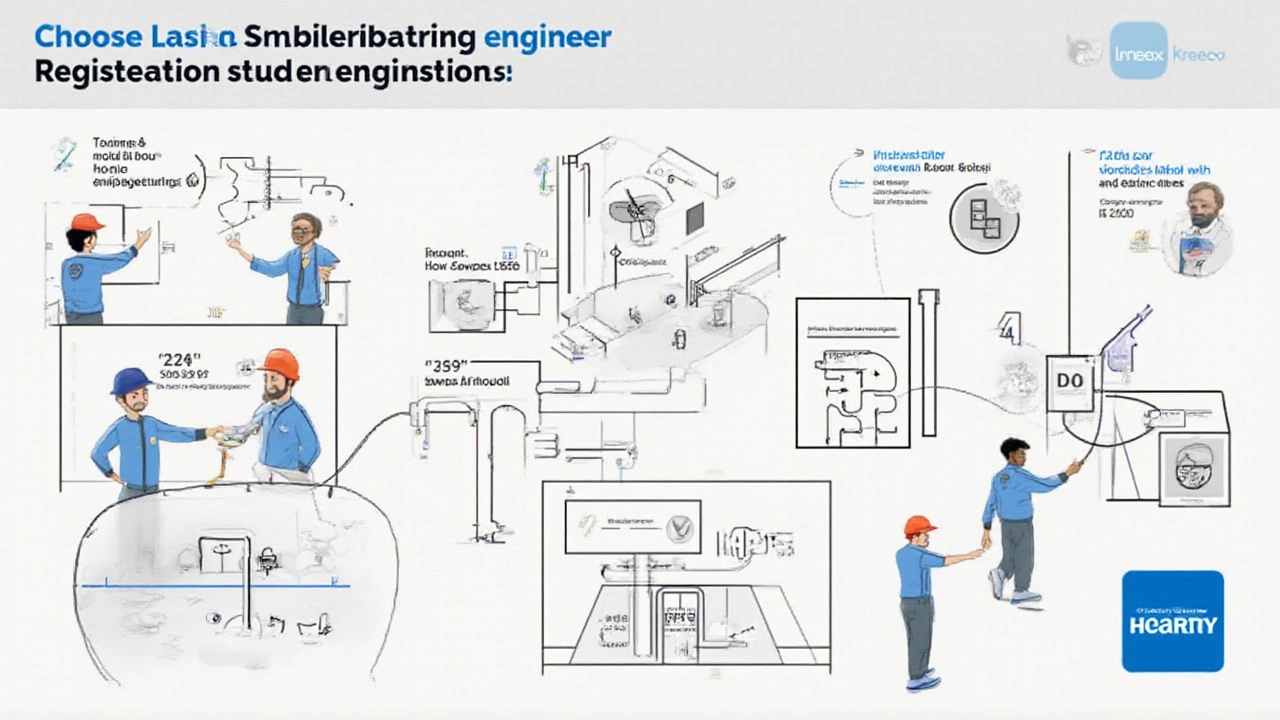Last winter, my neighbor Karen’s boiler packed up on the coldest night of December. She called a dozen people before figuring out who actually deals with replacing boilers. If you’ve ever wondered if a plumber is the one to call, you’re not alone—lots of folks get confused about who’s responsible for the job. The surprising truth is, not every plumber is automatically qualified to swap out your boiler. Things aren’t as straightforward as they might seem.
What Do Plumbers Actually Do?
Let’s clear up a big misconception first—plumbers aren’t just about sinks, toilets, and leaking pipes. They’re trained to sort out all kinds of water and heating issues in your home. Fixing a dripping tap? Sure. Replacing a busted radiator valve? That too. But when it comes to boilers, there’s a twist most people miss.
Your regular plumber can handle plenty of tasks inside and out, especially anything with water running through it. They’ll fix showers, install appliances like dishwashers, or sort out a clog in the middle of the night. But not every plumber is set up to handle gas, and that’s a huge deal when we’re talking about boilers. A boiler replacement isn’t just a plumbing job—it's a gas safety responsibility, too.
So, if your boiler runs on gas—which most in the UK do—you need a Gas Safe registered professional. This isn’t just me being fussy. The law says only someone on the Gas Safe Register can legally change a gas boiler. They keep themselves updated on safety, follow the strict rules, and frankly, nobody wants a rogue gas leak lurking under the floorboards. If it’s an electric or oil boiler, different sets of regulations apply, but training is still a must. A standard plumber might have these extra qualifications—or they might not. Always check first.
Where it gets a bit tricky is with heating engineers. Some are plumbers with extra training, while others focus solely on heating systems. Heating engineers usually work closely with plumbers or even fall under the same umbrella, depending on the company or your area. Still with me? Good, because knowing the right title for the pro you need makes your life a whole lot easier when the heating stops.
Do Plumbers Change Boilers? The Short and Long Answers
This is the biggie: Can you call ‘just any’ plumber and get your new boiler working by dinnertime? The short answer—maybe, but it depends. The longer answer is, you need to be sure your plumber holds the right registrations and knows the ropes for boiler work.
In the UK, any work on a gas boiler absolutely must be done by a Gas Safe registered engineer. This rule is in place for some really obvious (and serious) reasons. Gas leaks can be deadly, carbon monoxide is nothing to play with, and badly-fitted boilers cause massive headaches. The Gas Safe Register has strict requirements for training, testing, and annual checks. You can look up your engineer or company online to make sure they’re legit—just ask for their registration number.
Here’s where things get interesting. Many plumbers are indeed Gas Safe registered—lots of them even have the card in their wallet. If your plumber is one of these, then yes, they can legally and safely change out your boiler. But some plumbers don’t work with gas at all; they stick to water or drainage jobs. Before booking anyone, ask straight up: “Are you Gas Safe registered, and do you regularly install boilers?” No expert will mind, and the best will show you their card without blinking.
Now, what if you’re switching to an electric or oil boiler? This opens the door to other qualified pros besides Gas Safe engineers, but you still need proper credentials. For oil boilers, look for OFTEC registration. Electric boilers often require someone registered with a body like NICEIC. In the end, the right person for your boiler swap is the one with paperwork to prove it.
It’s worth adding that, even for non-gas systems, the complication of a boiler means your average handyman won’t cut it. There’s water pressure to check, venting to arrange, a tangle of wires, and often building regulations to follow up on. Don’t skimp. A badly-fitted boiler isn’t just inefficient; it’s a safety risk.

Step-by-Step: How Boiler Replacement Works
Let’s walk through what actually happens when you decide your clunky old boiler has puffed its last breath and you’re ready for a new one. Most plumbers—or heating engineers—follow a set process to make sure everything’s done right.
Here’s how the job usually unfolds:
- Initial consultation: The pro will visit and check your current boiler, the layout of your pipes, the flue, and your heating needs. Expect some questions—number of bathrooms, radiators, if you plan on home upgrades, that sort of thing.
- Choosing the new boiler: Based on your needs (and your budget), they’ll help you pick between combi, system, or conventional boilers. Efficiency, size, and even noise levels are all part of the chat.
- Planning the installation: If you’re changing type (like swapping a system boiler for a combi), more pipework may be needed. The engineer will walk you through the extra steps and what it’ll cost.
- Removal of the old boiler: With shut-off valves double-checked, the old unit comes out. Expect a bit of mess—draining water, some noise, and dust—but nothing your pro can’t handle.
- New installation: Pipes are cleaned, new connections made, the right venting arranged. If it’s a gas boiler, the Gas Safe engineer will check every joint and seal for leaks.
- Safety checks and commissioning: The installer runs full tests, makes adjustments, and records certificate details for approvals (including Building Regulation sign-off for most installs). You’ll get paperwork—don’t lose it.
This process usually takes a day or two, but repairs to radiators, pipework, or older heating systems can stretch the job longer. Expect to pay anywhere from £1,500 to over £4,000, depending on the boiler picked and any extra complications. Some engineers even offer quick finance deals to spread the hit to your bank account.
Check out this table showing typical average costs and expected installation times:
| Boiler Type | Average Cost (UK 2025) | Installation Time |
|---|---|---|
| Combi Boiler | £1,800 - £2,600 | 1 Day |
| System Boiler | £2,000 - £3,200 | 1 - 2 Days |
| Conventional Boiler | £2,500 - £4,000 | 2 Days |
Prices will jump up if you need major rerouting of pipes, new flues, or an upgrade to controls. Plan ahead and make sure any extra work is priced before the job starts so there aren’t nasty surprises.
Tips for Choosing the Right Pro for Your Boiler Change
Boiler swaps are serious business, so picking the right person is half the battle. Here’s what I tell friends and neighbors (and sometimes random folks who chat me up at the school gates):
- Always check credentials: For gas boilers, look for Gas Safe Register entry. For oil, that’s OFTEC. Electric? Ask for NICEIC registration.
- Ask for experience: Not all heating engineers have the same background. Some are wizards with combi systems, others better at tricky period properties. It’s perfectly fair to ask about recent jobs like yours.
- Insist on a fixed quote: The best pros will give you a clear, complete price—including parts, labor, and any extras like smart controls. Avoid vague ballpark figures.
- Look for reviews and recommendations: Word of mouth is gold. Ask friends, check local Facebook groups, or browse trusted review sites. If someone’s had a bad install, you’ll hear about it quick.
- Confirm warranty and aftercare: Most new boilers come with a hefty manufacturer’s warranty—but check if it requires annual servicing by a pro. Some installers offer their own support packages, too.
- Don’t forget building regs: Most new boiler installations (especially gas) have to be registered with your local authority. Your engineer should handle the paperwork for you, but double-check and keep your certificates safe.
- Get things in writing: Date of install, model, price, what’s included—anything that could cause confusion later should go on paper (or email at least).
- Ask about recycling: Many old boilers can be taken away free as part of the job. Some firms even recycle responsibly and offset your carbon footprint. Good to know.
One pro tip—if you’re in a rush (say, your boiler broke midwinter and the family is shivering), some suppliers offer quick installs, often within 48 hours. They’re not always the cheapest, but they can save the day when you’re desperate. But even in a hurry, never skip checking that crucial registration. It’s about your safety and your wallet.

Common Boiler Replacement Questions (and Straightforward Answers)
People ask me all sorts of things once they realize I know a bit about heating. Here are the top ones that pop up every time someone’s boiler throws in the towel:
- How do I know if my boiler needs changing? Old age is the big sign—if it’s over 15 years, it’s probably losing efficiency. Lumpy noises, frequent breakdowns, leaking water, or weird smells? Time to call an engineer.
- Do I need to change all my radiators too? Usually, no. But if your radiators are older than your boiler, a flush or replacement might be smart. Some pros will recommend this for the best efficiency.
- What paperwork should I get after a new boiler is fitted? A boiler installation certificate, Gas Safe Certification (if gas), and manufacturer’s warranty documents. Keep them safe—you’ll need them for home insurance or future buyers.
- How long will my new boiler last? Most modern boilers easily last 12–15 years with proper yearly servicing. Top brands—like Worcester, Vaillant, or Ideal—tend to have fewer problems and better warranties.
- Are new boilers really much more efficient? Big yes. Most modern models are around 90% efficient or higher. That means less wasted energy (and lower bills). The Energy Saving Trust reckons you could save £200–£350 a year compared to an old G-rated boiler.
People also ask about smart heating controls, hydrogen-ready boilers, and future-proofing their heating. Right now, these are smart things to ask about—boiler installs cost too much to need a do-over in three years.
If you’re ever not sure, double-check with your engineer—no question is too small. After all, you’re paying them to get things safe and sorted. And if something smells off (literally or figuratively), call for help before firing up the system.
So, do plumbers change boilers? The answer is yes—so long as they’re fully qualified to handle the job, especially where gas is involved. The real question is, have you found the right pro for your job, and did you check their credentials? Don’t be afraid to ask the tough questions. You’ll stay warm, safe, and much more relaxed when the cold winds hit.


